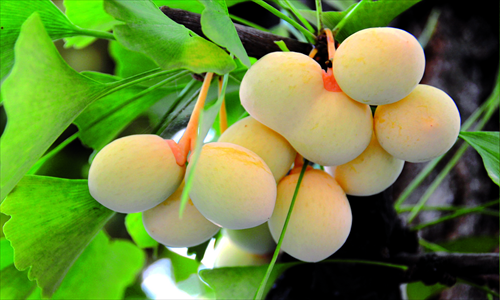Ginkgood or ginkbad? The jury’s out on ginkgo nuts

The autumn season does not only bring coldness in the air, but also nuts falling from trees on the roadsides of Beijng. Ginkgo nuts are among them. Occasionally, you can see people, especially those in their 50s and 60s or even older, bending down to pick them up on the street.
Li Fang, a 56-year-old woman who lives in Xicheng district, is one of these pickers. Every autumn, she carries a medium-sized basin and collects them to use as "medicine."
"It is good for the health and I always eat them after they are boiled," she said. For her, it is a gift of nature and a free-of-charge medicine.
"I heard that eating ginkgo is good for one's lungs and that's why I started to eat them. For me the effect was not so obvious, but you know, yangsheng [self caring to stay healthy] is a long-term project and you can't expect anything to happen so quickly," she said.
As the living standard in China keeps rising, more and more people embrace yangsheng and focus on creating a healthy way of life.
As a result, there are advertisements on the TV, in magazines and on the street for products that proclaim they are the best ones for the health, making these yangsheng products very fashionable. Super foods such as ginseng, ginkgo and Chinese caterpillar fungus are sold at a very high price, yet people are more than willing to pay.
According to traditional Chinese medicine (TCM) theory, ginkgo can be used as a medicine to cure various ailments and is overall good for the lungs and heart. TCM theory also believes that among the four seasons, autumn is best for people to take care of their lungs and is fortuitously the season when ginkgo nuts are ripe.
This helps explain why so many people are going to the streets to collect them right now.
However, not all sing the praises of ginkgo. Li Lanqing, a TCM doctor from the Tianjin Academy of Traditional Chinese Medicine Affiliated Hospital, expressed that ginkgo must be eaten only after being cooked or it could be harmful.
"It is understandable that people all want to live a long life but they need to know that TCM also has a saying 'every medicine has a side-effect', which means that one cannot have medicine without a doctor's prescription or instruction," Li said.
"Especially with ginkgo, it contains some poisonous elements, so one needs to get rid of its skin and core and boil it before eating," she went on.
According to Li, overeating ginkgo can be dangerous since it is hard for people to totally get ride of its poisonous part. Thus these elements accumulate in the body if one eats too much.
Overeating can bring about symptoms like nausea, dizziness, vomiting and, in extreme circumstances, even a coma. For children, it is better to keep them away from ginkgo since their organs are fragile and can't stand the damage caused by the poisonous elements.
Huang Yunyu from Dongzhimen Hospital affiliated to the Beijing University of Chinese Medicine, highlighted another problem. Namely, the heavy pollution nowadays coming from pesticides and car fumes, which can impact on ginkgo trees, polluting the nuts that grow.
"Beijing now has 5 million cars. You can imagine what a large influence the tail gas from those cars will have on ginkgo trees along Beijing streets," Huang explained. "Those trees can also absorb the heavy metal from the soil, which can accumulate in its nuts, so if people eat those nuts it is not good for yangsheng at all," he noted.
Huang also agreed with Li on the issue of overeating ginkgo. "It is recommended that one adult eats no more than 30 ginkgo nuts a day because it is like drinking alcohol. If one has too much he/she could die," he said.
Huang especially criticized people who eat ginkgo without analyzing their body type first. Those with too much inner heat are not suitable to eat ginkgo, he said, adding it would be good if people visit a doctor first.